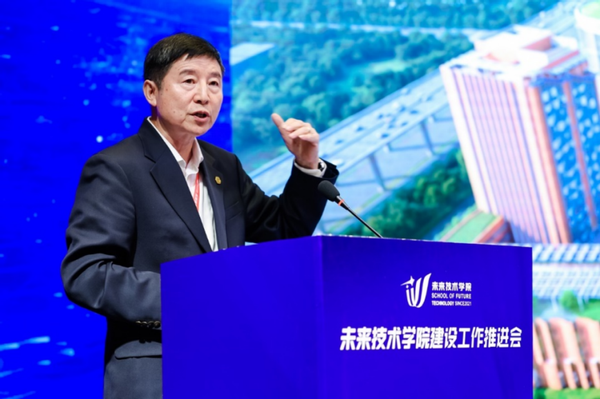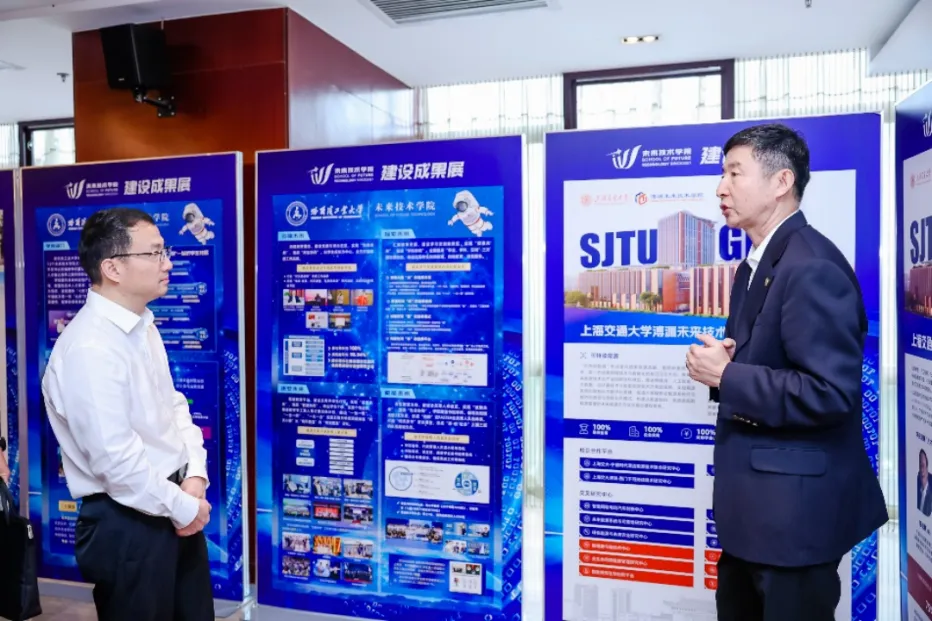In the morning of 25th July, the Ministry of Education's Future Technology Institute Development Meeting was held in Beijing, and the meeting carried out in-depth exchanges and discussions around further development of Future Technology Institutes. Representatives from the National Development and Reform Commission, the Ministry of Education, the Ministry of Science and Technology, the Ministry of Industry and Information Technology, the Ministry of Transport, the Ministry of Culture and Tourism, the State-owned Assets Supervision and Administration Commission of the State Council, the Chinese Academy of Sciences, current Future Technology Institutes and other institutions, as well as experts related to the educationand the industry sectors, attended the meeting. Ni Jun, Dean of GIFT and Chief Manufacturing Officer of CATL, made a keynote report at the meeting. Xi Lifeng, executive vice president of Shanghai Jiaotong University (hereafter SJTU), Yang Ming, Jin Sun, Wang Chong, Wang Jingchuan and other leaders of GIFT and faculty representatives attended the meeting.

With the title of “Exploration and Practice of Integration Innovation of Education, Science and Technology and Talents”, Dean Ni Jun introduced GIFT's schooling mission, educational progress, and the development of industry-academia cooperation platform, etc. He stressed that SJTU closely follows the requirements of the development guide of Future Technology Institute, studies future science and technology trends, identifies possible breakthroughs of strategic industries, and analyses the qualities and needs of future industry leaders. GIFT at SJTU plans to bind closely with CATL and other industry leaders, breaks traditional silos, and strengthens innovations and leadership. The institute is named “溥渊(Puyuan)”, because溥Pu means vastness and 渊Yuan means profoundness, symbolizing GIFT’s vision: valuing interdisciplinarity while encouraging delving deep into specificfields. More specifically GIFT focuses on the two directions of future energy and future health, and educating strategic and global scientific and technological leading talents.
After three years of development, GIFT has achieved milestones in exploring a new paradigm of industry-academia integration of scientific research and cross-field talent training. GIFT is committed to breaking the boundaries of learning, disciplines and schools, and has built two new undergraduate majors of sustainable energy and health science and technology in cooperation with leading enterprises and affiliated hospitals, as well as two postgraduate co-training bases in CATL and United Imaging. A large number of domestic and foreign leading scholars and industry leaders have been recruited to join GIFT, and more than 75 percent of GIFT's young faculty holds titles in “Four Youth Talents”; GIFT has set up a number of cross-research centers, such as the Future Battery Research Centre and the Brain Health and Technology Centre, and has continued to develop a full pipeline for talent education, scientific research, and commercialization.
Looking ahead, GIFT will, under the guidance of the Ministry of Education, strengthen the innovation of the industry-academia integration, build a strong faculty team, develop new education mode, and complete the construction of the twin towers base for GIFT. GIFT is posed to turn into an education and innovation hub with global influence and Chinese characteristics.

At the meeting, the Ministry of Education also held the inaugural meeting of the Future Technology College Development Committee, where the committee discussed work plans centered around special working groups for conference work, joint training, and faculty and student development. Yang Ming and Jin Sun from GIFT participated in the series of events. With leaders and experts from sister colleges, they discussed the development direction and cooperation and exchange mechanisms of future technology colleges.

In addition, the Ministry of Education also held an exhibition of the achievements of the development of Future Technology Institutes, and Zhou Tianhua, director of the Ministry of Education, and other leaders and colleagues from cooperative institutes visited the GIFT exhibition boards.

In 2021, the Ministry of Education established Future Technology Colleges at 12 universities including Peking University, Tsinghua University, and Shanghai Jiao Tong University, with the aim of developing them into sources of disruptive technological innovation and important bases for cultivating top-notch innovative talents. Starting from the supply side, these 12 Future Technology Colleges have strengthened conceptual changes, been led by master experts, and collaborated with multiple research institutes and leading enterprises. They have formed more than 30 future technology directions, explored innovative talent cultivation mechanisms, produced multiple domestically pioneering and internationally leading technological achievements, and cultivated a group of young talents with innovative thinking. These colleges have become important forces driving the development of emerging and future industries.







